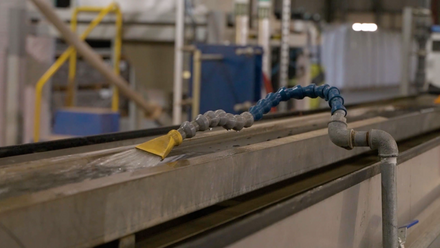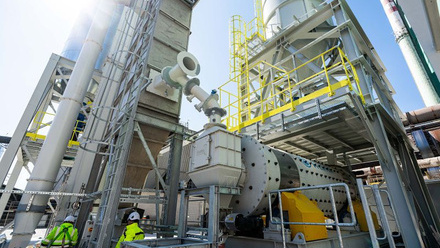What do the UK party manifestos say about materials, minerals and mining?
Ahead of the UK general election on 4 July, IOM3 has published a summary of the plans for materials, minerals and mining set out in the Conservative, Labour and Liberal Democrat manifestos.

There is one week to go to the UK general election – what do the UK party manifestos say about materials, minerals and mining?
IOM3 sets out the key commitments across five themes relevant to materials, minerals and mining in the Conservative, Labour and Liberal Democrat manifestos:
Energy & net-zero
Approach
- Remain committed to delivering net zero by 2050.
- Sticking to our pragmatic, proportionate and realistic approach that eases the burdens on working people.
- Guaranteeing a vote in the next Parliament on the next stage of our pathway.
- Reforming the Climate Change Committee, giving it an explicit mandate to consider cost to households and UK energy security in its future climate advice.
- Legislate to ensure annual licensing rounds for oil and gas production from our own North Sea windfall tax on oil and gas companies until 2028-2029.
- Maintain the investment allowances that provide incentives to invest in our North Sea.
Energy transition
- Treble our offshore wind capacity.
- Provide a bonus, on top of contract payments that support offshore wind, to reward energy firms that invest in manufacturing in the most disadvantaged places in the UK or invest in more sustainable supply chains.
- Ensure democratic consent for onshore wind support solar in the right places.
- Build the first two carbon capture and storage clusters.
- Scale up nuclear power.
- Within the first 100 days of the next Parliament, we will approve two new fleets of Small Modular Reactors.
- We will halve the time it takes for new nuclear reactors to be approved.
- Deliver a new gigawatt power plant at Wylfa in North Wales.
Oil & gas
- New gas power stations.
- Continue backing the North Sea Transition Deal and Aberdeen City Region Deal, with Aberdeen’s Investment Zone bringing £160 million of support to the area over the next ten years.
- Retain the current moratorium on fracking.
Green levies
- Ensuring that green levies on household bills are lower.
- Ruling out creating further green levies, and alongside our commitment not to introduce road pricing schemes, we will also rule out any fequent flyer levy.
Energy efficiency
- Invest £6 billion in energy efficiency over the next three years.
- Fund an energy efficiency voucher scheme, open to every household in England, to support the installation of energy efficiency measures and solar panels.
Approach
- Ensure the institutional framework for policy making reflects our commitments to reach net zero and meet our carbon budgets.
- A new Energy Independence Act will establish the framework for Labour’s energy and climate policies.
- Conservatives’ decision to prevent the Bank of England giving due consideration to climate change in its mandates will be reversed.
Energy transition
- Work with the private sector to double onshore wind, triple solar power, and quadruple offshore wind by 2030.
- Invest in carbon capture and storage, hydrogen and marine energy, and ensure we have the long-term energy storage our country needs.
- Ensure the long-term security of the sector, extending the lifetime of existing plants, and we will get Hinkley Point C over the line.
- Create a new publicly-owned company, Great British Energy headquartered in Scotland and capitalised with £8.3 billion over the next parliament to:
- deliver clean power by co-investing in leading technologies
- help support capital-intensive projects
- deploy local energy production to benefit communities across the country
- create jobs and build supply chains in every corner of the UK
- Great British Energy will partner with energy companies, local authorities, and co-operatives to install thousands of clean power projects, through a combination of onshore wind, solar, and hydropower projects.
- Will work with industry to upgrade our national transmission infrastructure and rewire Britain.
- Labour’s National Wealth Fund will directly invest in ports, hydrogen and industrial clusters in every corner of the country including £1 billion to accelerate the deployment of carbon capture and £500 million to support the manufacturing of green hydrogen.
Fossil fuels
- Maintain a strategic reserve of gas power stations.
- Phased and responsible transition in the North Sea.
- Embrace the future of energy production and storage which will make use of existing offshore infrastructure and the skills of our offshore workforce.
- Will not revoke existing licences and we will partner with business and workers to manage our existing fields for the entirety of their lifespan
- close the loopholes in the windfall tax on oil and gas companies.
- Extend the sunset clause in the Energy Profits Levy until the end of the next parliament.
- Increase the rate of the levy by three percentage points, as well as removing the unjustifiably generous investment allowances
- Retain the Energy Security Investment Mechanism.
- Not issue new licences to explore new fields.
- Not grant new coal licences.
- Ban fracking for good.
Approach
- Committed to cutting greenhouse gas emissions to net zero by 2045 at the latest.
- Meeting the UK’s commitment under the Paris Agreement to reduce emissions by at least 68% from 1990 levels by 2030.
- Appoint a Chief Secretary for Sustainability in the Treasury.
- Establish a new Net Zero Delivery Authority to coordinate action across government departments and work with devolved administrations, and hand more powers and resources to local councils for local net zero strategies.
- Coordinating action across the UK by creating a Joint Climate Council of the Nations.
- Requiring the National Infrastructure Commission to take fully into account the environmental implications of all national infrastructure decisions.
- Increase investment in green infrastructure, including renewable energy and zero-carbon transport, industry and housing, and give a clearer zero-carbon remit to the UK Infrastructure Bank.
-
Establish national and local citizens’ assemblies to give people real involvement in the decisions needed to tackle climate change.
-
Restore the UK’s role as a global leader on climate change, by returning international development spending to 0.7% of national income, with tackling climate change a key priority for development spending.
-
Working together with our European neighbours to tackle the climate emergency, including by associating the UK Emissions Trading System with the EU ETS.
Energy transition
- Invest in renewable power so that 90% of the UK’s electricity is generated from renewables by 2030.
- Removing restrictions on new solar and wind power, and supporting investment and innovation in tidal and wave power.
- Building the grid infrastructure required, facilitated by a strategic Land and Sea Use Framework.
- Decoupling electricity prices from the wholesale gas price.
- Investing in energy storage, including green hydrogen, pumped storage and battery capability.
- Working together with our European neighbours to build a sustainable supply chain for renewable energy technology.
- Empowering local authorities to develop local renewable electricity generation and storage strategies.
- Giving small low-carbon generators the right to export their electricity to an existing electricity supplier on fair terms.
- Making it cheaper and easier to switch to electric vehicles, restoring the requirement that every new car and small van sold from 2030 is zero emission, investing in active travel and public transport, electrifying Britain’s railways, and reducing the climate impact of flying.
- Invest in research and development to make the UK the world leader in zero-carbon flight, and take steps to reduce demand for flying.
- Establishing a ten-year plan for rail electrification to increase the number of passenger journeys covered by electric trains, investing in other zero-carbon technologies including batteries, and ensuring all new rail lines are electrified as standard
Fossil fuels
- Imposing a proper, one-off windfall tax on the super-profits of oil and gas producers and traders.
- Implementing the UK’s G7 pledge to end fossil fuel subsidies.
- Maintaining the ban on fracking and introducing a ban on new coal mines.
Households
- Reintroducing requirements for landlords to upgrade the energy efficiency of their properties to EPC C or above by 2028.
- A ten-year emergency upgrade programme, starting with free insulation and heat pumps for those on low incomes, and ensure that all new homes are zero-carbon.
- Providing incentives for installing heat pumps that cover the real costs.
- Expanding incentives for households to install solar panels, including a guaranteed fair price for electricity sold back into the grid.
Industry
- Putting tackling climate change at the heart of a new industrial strategy.
- Support British industry to cut emissions while holding businesses to account for their role in tackling climate change.
- Expand the British Business Bank to perform a more central role in the economy, to ensure that viable small and medium-sized businesses have access to capital, and enable it to help ‘crowd-in’ private investment, in particular in zero-carbon products and technologies.
Industrial strategy
As we achieve this transition to net zero, we will take steps to ensure the technology and infrastructure is made here in the UK.
Invest £1.1 billion into the Green Industries Growth Accelerator to support British manufacturing capabilities, boost supply chains and ensure our energy transition is made in Britain.
We will continue working to support production in Scunthorpe and the North East of England, securing the future of steelmaking across the UK.
Push forward with our Advanced Manufacturing Plan, providing a £4.5 billion commitment to secure strategic manufacturing sectors including automotive, aerospace, life sciences and clean energy
Introduce a new industrial strategy
Establish an Industrial Strategy Council, on a statutory footing, to provide expert advice.
Take a sectoral approach.
Secure the future of Britain’s automotive and steel industries.
Back what makes Britain great: our excellent research institutions, professional services, advanced manufacturing, and creative industries.
Set out plans for automotive, life sciences and other vital sectors of the economy
Ensure a pro-business environment, with a competition and regulatory framework, that supports innovation, investment, and high-quality jobs.
Procurement and trade policy will also be aligned with our industrial strategy priorities.
Publish a roadmap for business taxation for the next parliament
Will retain a permanent full expensing system for capital investment and the annual investment allowance for small business.
Update national planning policy to ensure the planning system meets the needs of a modern economy, making it easier to build laboratories, digital infrastructure, and gigafactories.
Support the transition to electric vehicles by accelerating the roll out of charge points, giving certainty to manufacturers by restoring the phase-out date of 2030 for new cars with internal combustion engines, and supporting buyers of second-hand electric cars by standardising the information supplied on the condition of batteries
Secure the UK aviation industry’s long-term future, including through promoting sustainable aviation fuels, and encouraging airspace modernisation
Capitalised with £7.3 billion over the course of the next Parliament, the National Wealth Fund will have a remit to support Labour’s growth and clean energy missions. Plan to allocate:
- £1.8 billion to upgrade ports and build supply chains across the UK
- £1.5 billion to new gigafactories so our automotive industry leads the world
- £2.5 billion to rebuild our steel industry
- £1 billion to accelerate the deployment of carbon capture
- £500 million to support the manufacturing of green hydrogen.
Reward clean energy developers with a British Jobs Bonus, allocating up to £500 million per year from 2026, to incentivise firms who offer good jobs, terms and conditions and build their manufacturing supply chains in our industrial heartlands, coastal areas, and energy communities.
Prioritise UK businesses for defence investment and will reform procurement to reduce waste.
National Wealth Fund supports the most energy intensive sectors to decarbonise.
Supports the introduction of a carbon border adjustment mechanism.
Take decisive action to improve building safety, including through regulation, to ensure we never again see a repeat of the Grenfell fire.
Develop an industrial strategy.
Re-establish the Industrial Strategy Council and put it on a statutory footing.
Setting out a clear and stable roadmap to net zero, repairing the damage done by Conservative U-turns and giving businesses the confidence to invest.
Expanding the market for climate-friendly products and services with steadily higher criteria in public procurement policy.
Implementing the Carbon Border Adjustment Mechanism for high-emission products, protecting UK businesses from unfair competition.
Reducing emissions from industrial processes by supporting carbon capture and storage and new low-carbon processes for cement and steel production.
Providing more advice to companies on cutting emissions, supporting the development of regional industrial clusters for zero-carbon innovation and increasing the Industrial Energy Transformation Fund.
Make it easy and cheap to charge electric vehicles by:
- Rolling out far more charging points, including residential on-street points and ultra-fast chargers at service stations.
- Supporting new charging points with an upgraded National Grid and a stepchange in local grid capacity.
- Cutting VAT on public charging to 5%.
- Requiring all charging points to be accessible with a bank card
Reduce the climate impact of flying by:
- Reforming the taxation of international flights to focus on those who fly the most, while reducing costs for ordinary households who take one or two international return flights per year.
- Introducing a new super tax on private jet flights, and removing the VAT exemptions for private, first-class and business-class flights.
- Requiring airlines to show the carbon emissions for domestic flights compared to the equivalent rail option at booking.
Resource management
Continue to develop a UK-wide Deposit Return Scheme, while working to minimise the impact on businesses and consumers.
Prevent new waste incinerators being built, including those with recent permit approvals, revoking those where substantial construction has not taken place.
Take comprehensive action to crack down on organised waste crime.
Continue with our moratorium on deep sea mining
Committed to reducing waste by moving to a circular economy.
Support diverse business models which bring innovation and new products to the market.
Ensure the UK has the highest possible standards of environmental, health, labour and consumer protection, at least matching EU standards.
Cut resource use, waste and pollution by accelerating the transition to a more circular economy that maximises the recovery, reuse, recycling and remanufacturing of products.
Introducing a deposit return scheme for food and drink bottles and containers, working with the devolved administrations to ensure consistency across the UK.
Aiming for the complete elimination of non-recyclable single-use plastics within three years and replacing them with affordable alternatives.
Setting an ambition of ending plastic waste exports by 2030.
Research, development & innovation
Increase public spending on R&D to £22 billion a year, up from £20 billion this year.
Maintain our R&D tax reliefs.
Improve access to finance for SMEs.
Build on the success of our nine specialist Catapults, which support innovation and de-risk the transition from research and delivery, distributing £1.6 billion of funding across the country by 2028.
Through our new Defence Innovation Agency, we will scale R&D funding to a minimum of 5% of the defence budget, together with an additional 2% to exploit that R&D, accelerating investments in new weapon systems.
Create the conditions to support innovation and growth in the sector, through supporting new technology, including Open Banking and Open Finance and ensuring a pro-innovation regulatory framework.
Scrap short funding cycles for key R&D institutions in favour of ten-year budgets that allow meaningful partnerships with industry to keep the UK at the forefront of global innovation.
Work with universities to support spinouts.
Work with industry to ensure start-ups have the access to finance they need to grow.
Create a new Regulatory Innovation Office.
Simplify the procurement process to support innovation and reduce micromanagement with a mission-driven approach.
Support science, research and innovation, particularly among small businesses and startups, in universities and in zero-carbon, environmental and medical technologies, including by:
- Continuing to participate in Horizon Europe and joining the European Innovation Council.
- Aiming for at least 3% of GDP to be invested in research and development by 2030, rising to 3.5% by 2034.
Power scale-up companies, especially outside of London and the South East, using innovative ways of ‘crowding-in’ private sector investment.
Skills
Transform 16-19 education by introducing the Advanced British Standard, enabling young people to receive a broader education and removing the artificial divide between academic and technical learning.
Create 100,000 more apprenticeships in England every year by the end of next Parliament.
Close university courses in England with the worst outcomes for their students.
Support the National Citizen Service to help young people build confidence and develop the skills they need to thrive.
Raise the Skilled Worker threshold and Family income requirement with inflation automatically.
Focus on supporting Scotland’s workforce transition to new industries such as carbon capture, offshore wind, hydrogen and tidal, including by providing £15 million to support the Energy Transition Zone’s skills programmes.
Invest in high quality British defence industry jobs across the UK.
Expand our childcare and early‐years system, drive up standards, modernise the school curriculum, reform assessment, and create higher-quality training and employment paths by empowering local communities to develop the skills people need.
Recruit 6,500 new expert teachers in key subjects.
Get more teachers into shortage subjects, support areas that face recruitment challenges, and tackle retention issues.
The way bursaries are allocated, and the structure of retention payments, will be reviewed.
introduce a new Teacher Training Entitlement to ensure teachers stay up to date on best practice with continuing professional development.
Bringing forward a comprehensive strategy for post‐16 education.
Put employers at the heart of our skills system.
Establish Skills England to bring together business, training providers and unions with national and local government to ensure we have the highly trained workforce needed to deliver Labour’s Industrial Strategy.
Skills England will formally work with the Migration Advisory Committee to make sure training in England accounts for the overall needs of the labour market.
Transform Further Education colleges into specialist Technical Excellence Colleges.
These colleges will work with businesses, trade unions, and local government to provide young people with better job opportunities and the highly trained workforce that local economies need.
Create a flexible Growth and Skills Levy, with Skills England consulting on eligible courses to ensure qualifications offer value for money.
Fix the skills and recruitment crisis by investing in education and training, including increasing the availability of apprenticeships and career advice for young people.
Creating a teacher workforce strategy to ensure that every secondary school child is taught by a specialist teacher in their subject.
Invest in people’s skills by:
- Replacing the broken apprenticeship levy with a broader and more flexible skills and training levy.
- Boosting the take-up of apprenticeships, including by guaranteeing they are paid at least the National Minimum Wage by scrapping the lower apprentice rate.
- Creating new Lifelong Skills Grants for adults to spend on education and training throughout their lives.
- Developing National Colleges as national centres of expertise for key sectors, such as renewable energy, to deliver the high-level vocational skills that businesses need.
- Identifying and seeking to solve skills gaps, such as the lack of advanced technicians, by expanding higher vocational training like foundation degrees, Higher National Diplomas, Higher National Certificates and Higher Apprenticeships.
- Improving the quality of vocational education, and strengthening careers advice and links with employers in schools and colleges.
Fix the work visa system and expand the Youth Mobility Scheme.
Urgently establish a standing commission to build a long-term consensus across parties and teachers to broaden the curriculum and make qualifications at 16 and 18 fit for the 21st century.
Strengthen careers advice and links with employers in schools and colleges.
Ensuring a just transition that values the skills and experience of people working in the oil and gas industry and provides good opportunities for them.
Investing in education and training to equip people with the skills needed for the low-carbon economy of the future.
Whilst there are a number of welcome commitments across the parties, there remains insufficient focus and strategic approach to responsible sourcing, use and management of the materials and minerals that underpin our economy, our every day lives and the low-carbon transition. IOM3 has published a policy briefing setting out five priorities for the next UK government, with underpinning recommendations, to drive the transition to a more resilient and sustainable future.







